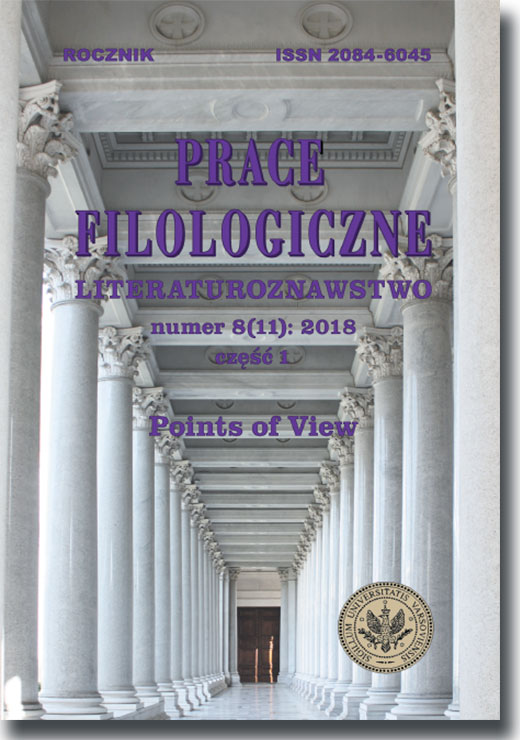Tellers and Experiencers in Autobiographical Narratives: Focalization in {Peeling the Onion} by Günter Grass and {The Liars’} Club by Mary Karr
Tellers and Experiencers in Autobiographical Narratives: Focalization in {Peeling the Onion} by Günter Grass and {The Liars’} Club by Mary Karr
Author(s): Zuzana FoniokováSubject(s): Language and Literature Studies, Studies of Literature
Published by: Wydział Polonistyki Uniwersytetu Warszawskiego
Keywords: autobiografia; punkt widzenia; fokalizacja; Grass; Karr; autobiography; perspective; focalization; Grass; Karr
Summary/Abstract: This article examines the narrative point of view in two autobiographical texts, pointing out the diverse effects the narratives achieve by means of different focalization strategies. After a short explication of the split between the narrator and protagonist in life stories, I look at focalization techniques in Gu¨nter Grass’s {Peeling the Onion} (2006), where the perception of the present self continuously interferes in the depiction of the past. The superior knowledge available to the narrator at the time of narration leads to an interpretation of the depicted events that the experiencing self could not provide. I argue that although the book calls attention to the constructive nature of memory and narrative that necessarily affects retrospective accounts of the past, it also states its preference for the lens of the present by employing focalization through the narrating I. I subsequently contrast Grass’s text and its narrative strategies with Mary Karr’s childhood memoir {The Liars’ Club} (1995) and demonstrate how this narrative attains its realistic effect by engaging the child protagonist as the predominant focalizer. By shifting focalization between the narrating I and the experiencing I, involving either the suspension or application of the narrator’s current knowledge, Karr manipulates readers’ engagement with the narrative, such as their empathy and moral judgement. Furthermore, the text communicates a sense of identity and continuity between the experiencer and the teller, which stands in sharp contrast to the emphasis Grass’s narrative puts on the distance between these two positions. Finally, I briefly address the challenges presented by recent conceptions of identity construction to the distinction between the narrating I and the experiencing I, suggesting that these narratological concepts retain their relevance to discussions of autobiographical texts as literary works rather than stages of self-creation. Artykuł dotyczy punktu widzenia w dwóch tekstach autobiograficznych i zróżnicowanych efektów, jakie przynoszą różne strategie fokalizacji. Po krótkim wprowadzeniu poświęconym różnicy między narratorem a bohaterem w narracjach o sobie przyglądam się technikom fokalizacji w {Przy obieraniu cebuli} Güntera Grassa (2006); w opisywanie przeszłości ciągle ingeruje tam obecne „ja”. Wiedza dostępna narratorowi w chwili opowiadania wpływa na interpretację wydarzeń z przeszłości, do której „ja” przeżywające nie miało dostępu. Mimo że książka stawia problem konstrukcyjnej natury pamięci i narracji, które zawsze wpływają na retrospektywne relacje o przeszłości, poprzez fokalizację (perspektywę „ja” opowiadającego) zdaje się preferować teraźniejszy punkt widzenia. Zestawiam książkę Grassa i zastosowane w niej strategie narracyjne z opartą na wspomnieniach z dzieciństwa książką {The Liars’ Club} [{Klub kłamców}] Mary Karr (1995) i pokazuję, jak uczynienie fokalizatorem dziecka przyczynia się do uzyskania efektu realności. Zmiany perspektywy (od „ja” opowiadającego do „ja” przeżywającego), wymagające uruchomienia lub zawieszenia aktualnej wiedzy narratora, sprawiają, że Karr wpływa na zaangażowanie czytelnika, jego empatię czy oceny moralne. Ponadto tekst buduje wrażenie tożsamości „ja” opowiadającego i „ja” przeżywającego − zupełnie inaczej niż książka Grassa, mocno je przeciwstawiąjąca. W końcowej części tekstu odnoszę się do współczesnych koncepcji tożsamości i zestawiam je z opozycją „ja” przeżywającego i „ja” opowiadającego. Uznaję, że używanie tych pojęć wymaga traktowania tekstów autobiograficznych jako tekstów literackich, a nie etapów konstruowania tożsamości.
Journal: Prace Filologiczne. Literaturoznawstwo [PFLIT]
- Issue Year: 1/2018
- Issue No: 8 (11)
- Page Range: 113-128
- Page Count: 16
- Language: English

